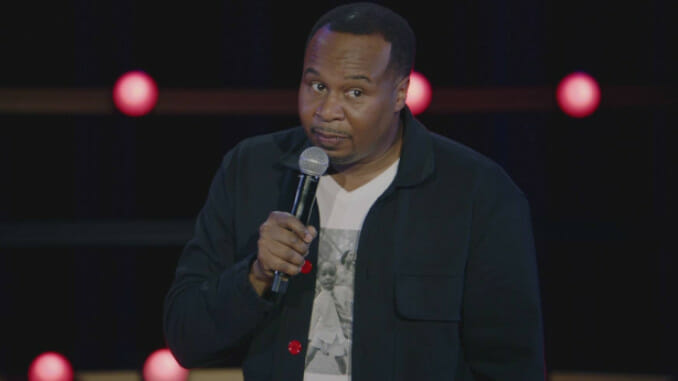Roy Wood Jr.’s Imperfect Messenger Is Funny, Thought-Provoking, and Empathetic

Roy Wood Jr.’s third stand-up special Imperfect Messenger is a perfectly-titled comedy special for this imperfect time. The Daily Show correspondent opens with thoughts on the last two years changing the context of the question, “How are you doing?” and connects that to a joke that serves as a thesis, or at least a recurring note: we are in bleak times and everyone is trying to find just a little bit of joy in their lives. Over the course of Imperfect Messenger, Wood comes back to this idea frequently.
Wood’s stand-up special talks about the specific circumstances of oppression and marginalization of Black people in the United States without showing disdain for any other overlapping minority groups. I didn’t used to think that was profound, but here we are. Wood talks about racism, of the personal and structural sorts, and even across continents. It would feel like a curse to say he “speaks truly and freely,” because of who that might associate him with, but he does speak honestly and openly.
Comedians sometimes want to shut down any criticism by saying their words are “just jokes,” while simultaneously wanting to be taken seriously as philosophers commenting on current events. A lot of stand-up can take place on a spectrum if you make those two points its poles, rather than an intersection. But who’s to say it’s even that clean a difference? Comedy, like most artistic and creative jobs, requires its artists to pour out of themselves for the sake of captivating and entertaining their audience. If a comedian takes themselves too seriously, this might lead to an over-abundance of what I’ve heard comedians derisively refer to as “clapter,” where people aren’t laughing at jokes, they’re only clapping because they agree. But even clapter exists on a spectrum, from something that’s both funny and true, to something that simply assures the audience member that their preconceptions about the world are correct and someone paid to make them laugh also thinks how they think.
Roy Wood Jr. is a talented comedian, and he’s skilled at crafting jokes that work on multiple levels. And when he tells jokes that could be offensive if taken too seriously, he doesn’t hiss at the audience for pulling back. Yet, I can only remember “awwws” coming once, and they were more groans at the system and expressions of empathy than bitterness or disappointment toward the performer. His jokes aren’t shock-jock comedy – he’s just talking about the nature of racism in the United States. There are jokes about performative allyship, police code words, and legislative ineffectiveness; there are stories about interacting with the police as a young comedian on tour.
He makes nuanced jokes about nuance. He talks about the positive impact police could have by “just doing their jobs,” though he neglects to focus much on their abuses of power. He draws from a broad pool of references so that the show is timely without being so locked-in that it will be no fun to watch in a few years. There’s probably no way for comedy to be fully immune to the ravages of time, but a good enough joke can be resistant to erosion, while informing its audience about the time it was made in.